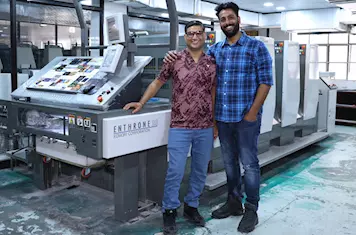Chennai: This startup aims to 3D-print Vande Bharat | Chennai News
What do new-age startups like Agnikul rockets, ePlane e-taxi, and Hyperloop, the futuristic Hyperloop all have in common? All of these startups use carbon fibre parts that were 3D printed by Fabheads Automation, a startup in Chennai.
Dinesh Kanagaraj and Abhijit Rathore – IITians working at space agency Isro – were stumped by the rate of rejection they observed with conventionally manufactured carbon fibre. They decided to launch their own venture in order to address the problem. Carbon fibre is an important composite that powers new-age innovations like drones, electric vehicles and air taxis. Fabheads has reduced lead times and improved reliability by automating production.
“Satellites, rockets, bicycles, surfing boards; there are a lot of areas that use carbon fibre today. We wanted to automate what is essentially a very manual labouroriented process,” says Kanagaraj, CEO, Fabheads. The startup has been able to lower manufacturing costs by nearly 10%, reduce the weight of products for its clients and reduce rejections from 10% to 20%. “We have nine patents granted and more in the process,” he adds.
Starting in 2015, the team for 2-3 years focused on R&D on its additive manufacturing technology. The team operated on a tight budget and even built its own 3D-printer rather than purchase it. The startup was also supported by IIT Madras’s incubation cell and industry mentors.
It began selling its products in 2021 and provided 3D-printed components to the aerospace, automotive, and any other sector that needed lightweight carbon fibre parts. “Almost 80% of our 3D-printing machine is made of Indian components,” says Nivas V, CMO, Fabheads.
“An order from a drone company that combined our design and manufacturing capabilities was a big inflection point for us,” says Abhijeet Rathore, CTO, Fabheads. “This helped us emerge as a company to help clients with end-to-end support,” he adds.
Carbon fibre manufacturing is not as developed as the metals industry, despite the fact that its strength-toweight ratio makes it appealing to manufacturers. Startups in this area are rare globally. Fabheads’ revenue has steadily increased over the past two years and it now boasts a healthy order list. Fabheads has a good problem for a startup – it is currently at capacity and needs to raise $7-$8million to expand its capacity in order to meet the increasing demand.
“We will be renting a bigger factory space, hiring more people, and will also be developing bigger 3D-printed machines to make 5-metre parts,” says Kanagaraj. The company plans to more than triple their number of machines. “We will look to have satellite offices globally, especially in Europe, which has a defined market. ”
The company is also working to get medical certifications and exploring the use 3D-printed fibres in medical implants. Carbon fibre technology is taught in very few universities, as it’s a niche field of material sciences. Fabheads taps industrial training institutes (ITIs) for freshers and the state’s MSME ecosystem for vendor ecosystem.
“Take any sector that is tapping modernisation and new-age technologies, we can serve them. We aim to expand to a size that will serve Vande Bharat one day,” says a confident Kanagaraj.
Dinesh Kanagaraj and Abhijit Rathore – IITians working at space agency Isro – were stumped by the rate of rejection they observed with conventionally manufactured carbon fibre. They decided to launch their own venture in order to address the problem. Carbon fibre is an important composite that powers new-age innovations like drones, electric vehicles and air taxis. Fabheads has reduced lead times and improved reliability by automating production.
“Satellites, rockets, bicycles, surfing boards; there are a lot of areas that use carbon fibre today. We wanted to automate what is essentially a very manual labouroriented process,” says Kanagaraj, CEO, Fabheads. The startup has been able to lower manufacturing costs by nearly 10%, reduce the weight of products for its clients and reduce rejections from 10% to 20%. “We have nine patents granted and more in the process,” he adds.
Starting in 2015, the team for 2-3 years focused on R&D on its additive manufacturing technology. The team operated on a tight budget and even built its own 3D-printer rather than purchase it. The startup was also supported by IIT Madras’s incubation cell and industry mentors.
It began selling its products in 2021 and provided 3D-printed components to the aerospace, automotive, and any other sector that needed lightweight carbon fibre parts. “Almost 80% of our 3D-printing machine is made of Indian components,” says Nivas V, CMO, Fabheads.
“An order from a drone company that combined our design and manufacturing capabilities was a big inflection point for us,” says Abhijeet Rathore, CTO, Fabheads. “This helped us emerge as a company to help clients with end-to-end support,” he adds.
Carbon fibre manufacturing is not as developed as the metals industry, despite the fact that its strength-toweight ratio makes it appealing to manufacturers. Startups in this area are rare globally. Fabheads’ revenue has steadily increased over the past two years and it now boasts a healthy order list. Fabheads has a good problem for a startup – it is currently at capacity and needs to raise $7-$8million to expand its capacity in order to meet the increasing demand.
“We will be renting a bigger factory space, hiring more people, and will also be developing bigger 3D-printed machines to make 5-metre parts,” says Kanagaraj. The company plans to more than triple their number of machines. “We will look to have satellite offices globally, especially in Europe, which has a defined market. ”
The company is also working to get medical certifications and exploring the use 3D-printed fibres in medical implants. Carbon fibre technology is taught in very few universities, as it’s a niche field of material sciences. Fabheads taps industrial training institutes (ITIs) for freshers and the state’s MSME ecosystem for vendor ecosystem.
“Take any sector that is tapping modernisation and new-age technologies, we can serve them. We aim to expand to a size that will serve Vande Bharat one day,” says a confident Kanagaraj.


